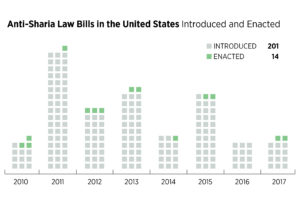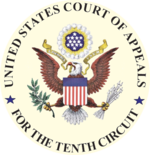
 New Paper by Will Smiley :: State Legislation Against Islamic Law (Forthcoming) In the Program in Islamic Law’s first Occasional Paper, Will Smiley of the University of New Hampshire takes a close look at state legislative bans on Islamic law, or sharī ͑a , as foreign law. His paper identifies and critiques the range of state bans on Islamic law by reviewing the cases presented by the Center for Security Policy (CSP)’s report on them. In a close analysis of the case law, Smiley challenges the CSP claims that U.S. courts apply foreign law, rather than—as the analysis shows—ordinary state and federal laws, state public policy, and principles of comity when in accord with the latter two. “In none of these cases would the various forms of proposed legislation have been likely to alter the result,” writes Smiley. He concludes then that the bans are both ineffective, unnecessary, and possibly in violation of the U.S. constitution, as the Tenth Circuit Court of Appeals concluded with the one state ban to mention Islamic law explicitly in the Awad v. Ziriax case in 2012. He further argues that, even if the bans are not unconstitutionally discriminatory in their effect, they nevertheless fail to achieve their claimed purpose. For the full article, read the Occasional Paper —also to be published as the lead article for our new journal, forthcoming in Spring 2019. Image credit: Southern Poverty Law Center
New Paper by Will Smiley :: State Legislation Against Islamic Law (Forthcoming) In the Program in Islamic Law’s first Occasional Paper, Will Smiley of the University of New Hampshire takes a close look at state legislative bans on Islamic law, or sharī ͑a , as foreign law. His paper identifies and critiques the range of state bans on Islamic law by reviewing the cases presented by the Center for Security Policy (CSP)’s report on them. In a close analysis of the case law, Smiley challenges the CSP claims that U.S. courts apply foreign law, rather than—as the analysis shows—ordinary state and federal laws, state public policy, and principles of comity when in accord with the latter two. “In none of these cases would the various forms of proposed legislation have been likely to alter the result,” writes Smiley. He concludes then that the bans are both ineffective, unnecessary, and possibly in violation of the U.S. constitution, as the Tenth Circuit Court of Appeals concluded with the one state ban to mention Islamic law explicitly in the Awad v. Ziriax case in 2012. He further argues that, even if the bans are not unconstitutionally discriminatory in their effect, they nevertheless fail to achieve their claimed purpose. For the full article, read the Occasional Paper —also to be published as the lead article for our new journal, forthcoming in Spring 2019. Image credit: Southern Poverty Law Center
 CASE :: Awad v. Ziriax (10th Cir. 2012): Federal Court Enjoins State Ban on “Sharīʿa Law” In the single case of explicit state bans to go up to a federal appeals court, Petitioner Muneer Awad sued defendant members of the Oklahoma Election Board. He sought to prevent certification of the election results of a proposed state constitutional amendment that would have prevented Oklahoma state courts from considering “Sharia Law.” The Petitioner argued that the ban would have violated his federal constitutional First Amendment rights and sought an injunction against it. The Tenth Circuit Court of Appeals agreed, stating that Awad “will suffer such a condemnation injury [government condemnation of one’s religion] in violation of constitutional rights.” It therefore determined that the Petitioner asserted the kind of direct injury-in-fact necessary to create First Amendment Establishment Clause standing, and that he had a likelihood of success on the merits of having the ban declared unconstitutional. It therefore confirmed the District Court’s injunction, making it permanent. Read more. Image credit: United States Court of Appeals for the Tenth Circuit/Wikimedia
CASE :: Awad v. Ziriax (10th Cir. 2012): Federal Court Enjoins State Ban on “Sharīʿa Law” In the single case of explicit state bans to go up to a federal appeals court, Petitioner Muneer Awad sued defendant members of the Oklahoma Election Board. He sought to prevent certification of the election results of a proposed state constitutional amendment that would have prevented Oklahoma state courts from considering “Sharia Law.” The Petitioner argued that the ban would have violated his federal constitutional First Amendment rights and sought an injunction against it. The Tenth Circuit Court of Appeals agreed, stating that Awad “will suffer such a condemnation injury [government condemnation of one’s religion] in violation of constitutional rights.” It therefore determined that the Petitioner asserted the kind of direct injury-in-fact necessary to create First Amendment Establishment Clause standing, and that he had a likelihood of success on the merits of having the ban declared unconstitutional. It therefore confirmed the District Court’s injunction, making it permanent. Read more. Image credit: United States Court of Appeals for the Tenth Circuit/Wikimedia
 PODCAST :: Islam: An American Religion : Interview with Nadia MarzoukiIn a new podcast series, the Program in Islamic law features Nadia Marzouki of CNRS Paris, discussing her book Islam: An American Religion(2013). SHARIAsource Deputy Editor Sharon Taiinterviewed her about the social-legal implications of Islamic law in the United States. This podcast is the first in a series of conversations that we will have and share with scholars in Islamic legal studies, writ large. Listen to the interview and read the transcript. Image credit: Columbia University Press
PODCAST :: Islam: An American Religion : Interview with Nadia MarzoukiIn a new podcast series, the Program in Islamic law features Nadia Marzouki of CNRS Paris, discussing her book Islam: An American Religion(2013). SHARIAsource Deputy Editor Sharon Taiinterviewed her about the social-legal implications of Islamic law in the United States. This podcast is the first in a series of conversations that we will have and share with scholars in Islamic legal studies, writ large. Listen to the interview and read the transcript. Image credit: Columbia University Press
See the full newsletter.

